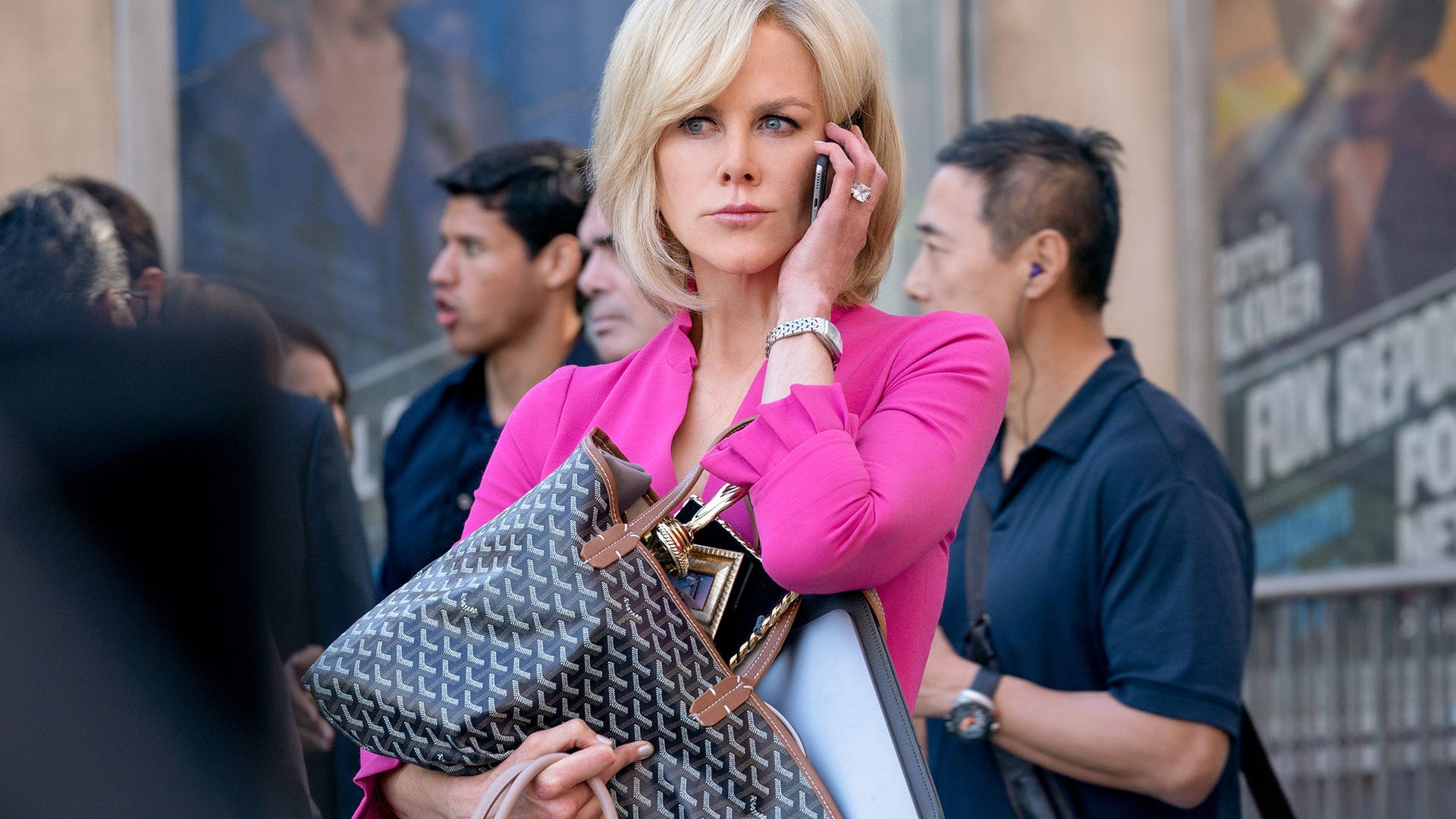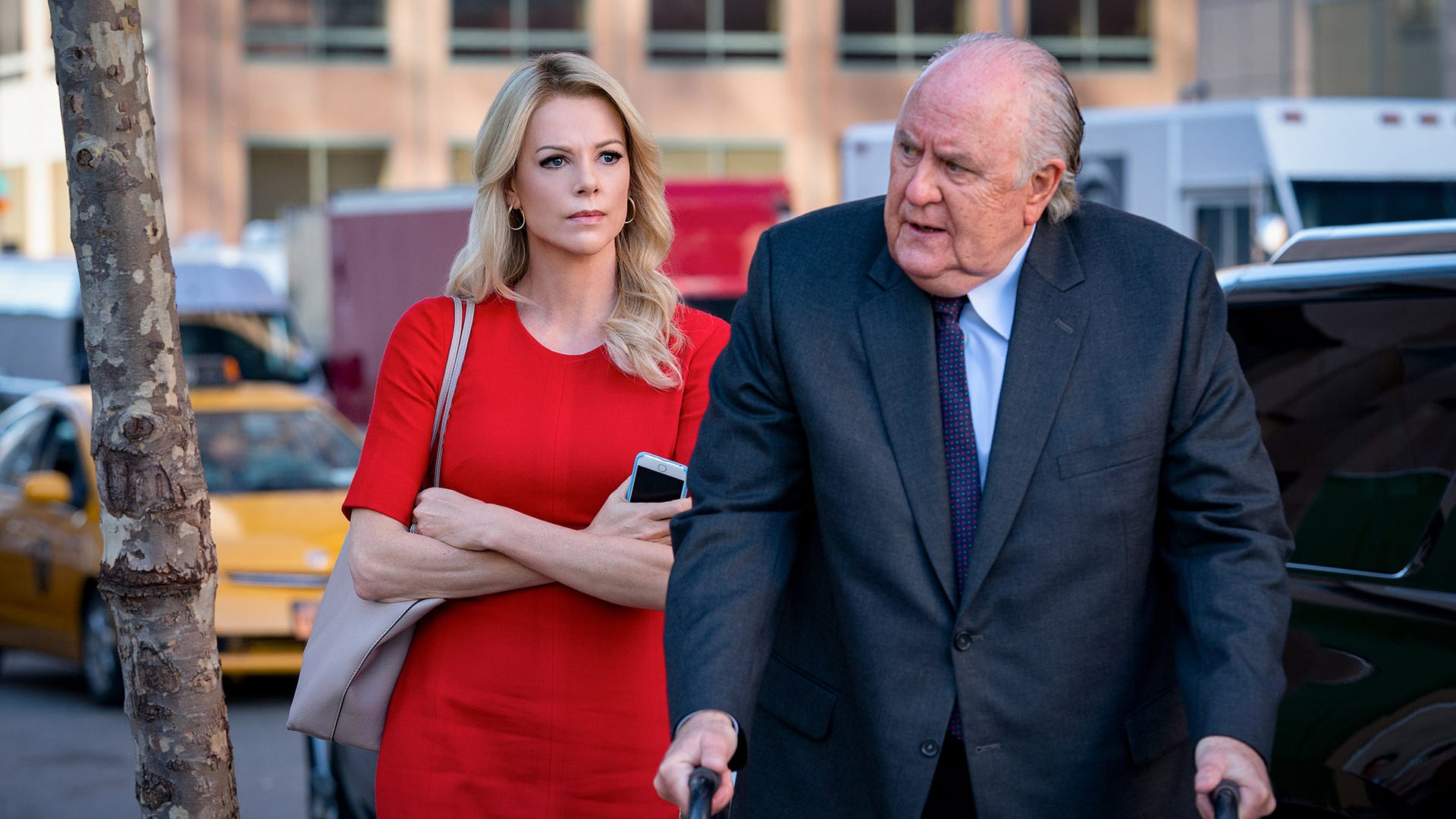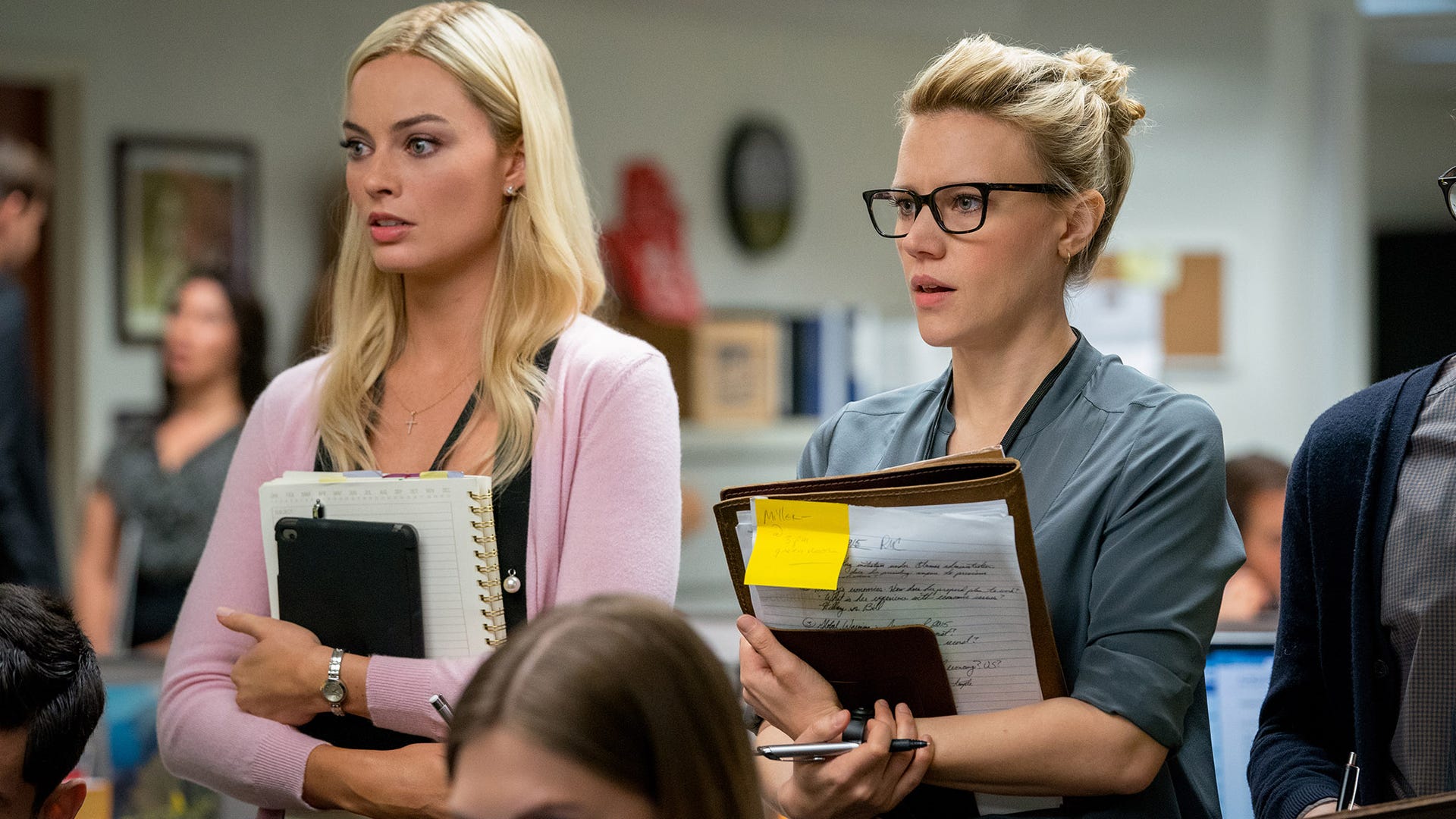Join or Sign In
Sign in to customize your TV listings
By joining TV Guide, you agree to our Terms of Use and acknowledge the data practices in our Privacy Policy.
Fox News Exposé Bombshell Thrives Where The Loudest Voice Faltered
Abusers aren't nearly as interesting as the women who resist them
A.J. Bauer is visiting assistant professor of media, culture, and communication at NYU and co-editor of News on the Right. This summer, along with Reece Peck, he wrote weekly recaps of The Loudest Voice, the Showtime limited series biopic of disgraced Fox News chairman and CEO Roger Ailes.
Fox News is about as unlikely a canvas as one can imagine for feminist agitprop.
The cable network founded by misogynists for conservatives, notorious for its on-air sexual objectification of women and off-air sexual harassment, is similarly not a setting that lends itself to political nuance.
Bombshell, directed by Jay Roach (The Campaign, Trumbo) and written by Charles Randolph (The Big Short), impressively threads the needle -- complicating Fox stereotypes, while subtly making the case for collective action against workplace sexual harassment.
Full disclosure: I was initially a Bombshell skeptic. The film's teaser trailer suggested a sexist catfight narrative, with three Fox Blondes eying one another competitively in an elevator. How could a film by the director of Austin Powers have anything responsible or politically productive to say about #MeToo?
My wariness was also based on having just finished watching The Loudest Voice, Showtime's toxic biographical limited series on the life of Fox founder, chairman, and chief sexual abuser Roger Ailes, which aired in seven parts this summer. As Reece Peck and I chronicled at length, The Loudest Voice suffered from a presentist focus that relegated Ailes' political significance to that of ushering in a Donald Trump presidency. Worse, in foregrounding the perspective and voice of a serial sexual abuser, Loudest Voice unwittingly reproduced Ailes' own misogynist typology of female agency -- depicting women as either loyal (Beth Ailes), objects of sexual desire (Laurie Luhn), or resolute victims seeking vengeance (Gretchen Carlson).
Bombshell, on the other hand, foregrounds the perspectives and voices of women. Using an up-tempo and informational yet playfully conversational narrative style (think The Big Short or Vice), the film follows the lives of three Fox women as they navigate the network's sexism while negotiating between their individual career ambitions and a growing sense of their collective agency in the run-up to the 2016 presidential election.
Like Loudest Voice before it, Bombshell features impressive makeup and prostheses work that transforms its actresses and actors into incredible likenesses of their real-life counterparts. Through voiceovers and fourth-wall-breaking narration, Bombshell goes a step further -- giving its audience a glimpse of the interiority of Fox women, revealing their complex professional and political subjectivities.
Stunning performances by Charlize Theron and Nicole Kidman, who skillfully reproduce the vocal stylings and mannerisms of Megyn Kelly and Gretchen Carlson, respectively, bolster the film's realism, while Margot Robbie artfully conjures Kayla Pospisil, a composite character of considerable depth. Narrating Ailes' downfall through the perspectives of these three compelling women -- Kelly, Carlson, Pospisil -- Bombshell manages to capture the complex personal motivations that make collective organizing so challenging.
While all three women share similar, though not identical, experiences of sexual abuse by Ailes, each character represents the toll harassment takes at different stages of a given career trajectory. Their varying power within the Fox newsroom obscures their shared struggle, and the film depicts their gradual recognition that overcoming workplace patriarchy requires mutual acts of solidarity.
We're first introduced to the internal dynamics of Fox News by Megyn Kelly, who we find at the zenith of her career -- leveraging her considerable star power to call out Republican presidential candidate Donald Trump for his chronic misogyny and repeated transgressions against women. Despite her outspoken anti-sexism, Kelly has earned the respect of Ailes, who more or less treats her as a peer. She arguably has the most to lose in challenging him, but she's also in the strongest position to do so.

Nicole Kidman as Gretchen Carlson in Bombshell
Hilary Bronwyn Gayle / LionsgateGretchen Carlson, whom we find approaching the nadir of her Fox career, bears the brunt of Ailes' bullying for her refusal to accede to his sexist demands. He constantly berates her for her physical appearance, and he gives her a less desirable timeslot. Carlson retaliates within the limits of her agency, staging pseudo-feminist stunts (such as going on air without makeup) while surreptitiously recording Ailes' tirades as evidence for her impending sexual harassment lawsuit against him.
Unlike The Loudest Voice, in which Naomi Watts plays Carlson as resilient but tentative -- primarily guided by her attorneys, and variously concerned about the impact of her struggle on her bro of a husband -- Kidman's Carlson is calling the shots. Her confidence is only mitigated by her cognizance that her lawsuit's success is reliant on a subsequent coming forward of other Fox women -- an uprising that initially fails to materialize.
Kayla Pospisil, a composite character in the early stages of her career, begins the film as an associate producer for Carlson but, sensing that Carlson's star is fading, takes an opportunity to work for Bill O'Reilly in hopes of angling her way into an on-air position. While the ideological commitments of Kelly and Carlson are largely glossed over -- one of Bombshell's few faults is its failure to reckon with both women's complicity in the Republican Party's increasing toxicity, particularly surrounding race, gender, and sexuality -- Pospisil is depicted as a movement conservative, a Christian evangelical who regularly listens to Rush Limbaugh.
In a narrative choice that productively complicates our understanding of the relative weight of ideology versus style at Fox, Pospisil's conservative orthodoxy makes her an outlier in a newsroom otherwise full of television-minded careerists. Pospisil's own on-air ambitions require that she learn to craft her conservatism to fit the network's populist stylistic conventions. They also drive her interactions with Ailes, who gawks over her body before coercing her into performing sexual acts in exchange for on-air stardom.

Charlize Theron as Megyn Kelly and John Lithgow as Roger Ailes in Bombshell
Hilary Bronwyn Gayle / LionsgateJohn Lithgow's portrayal of Roger Ailes is less grotesque than Russell Crowe's, but somehow even creepier. Crowe's Ailes was a caricature, "Right-wing. Paranoid. Fat." Lithgow's Ailes exhibits all the same personality flaws, but does not belabor them. That's in part because Bombshell casts Ailes as its villain, but not its focal point. Bombshell is not only an object lesson in less is more; it is a case in point that abusers aren't nearly as interesting or compelling as the narratives of those who resist them.
Whereas Loudest Voice gratuitously dramatized Ailes' repeated sexual assault of Fox booker Laurie Luhn (Annabelle Wallis), at times drawing on pornographic frames that foisted the viewer into Ailes' misogynist vantage, Bombshell avoids such blatant pandering to a prurient male gaze. Sexual assault is discussed, but not depicted. Sexual harassment is depicted as not merely about sex, but about power and domination.
Bombshell also outpaces Loudest Voice via its portrayal of female sexual empowerment. Kelly and Pospisil are both depicted as having and acting upon their own sexual desires. For Pospisil, that includes a brief no-shame same-sex tryst that provocatively and humorously plays with audience assumptions about the relationship between queerness and evangelical conservatism.

Margot Robbie as Kayla Pospisil and Kate McKinnon as Jess Carr in Bombshell
Hilary Bronwyn Gayle / LionsgateCasual queer sex is the last thing you'd expect in a film about Fox News, but it underscores Bombshell's surprisingly refreshing politics. The film nimbly avoids the tired political tropes of our era -- tribalism is reduced to laugh lines.
In lieu of identity politics, Bombshell advances a surprisingly sophisticated vision of collective action. Megyn Kelly starts the film declaring, "I'm not a feminist, I'm a lawyer," and is at first apprehensive to validate Carlson's lawsuit by sharing her own experience of harassment by Ailes. But it is her own meticulous legalistic fact-finding, in the wake of Carlson's suit, that helps uncover a critical mass of women who also quietly suffered the consequences of Ailes' decades of sexual predation.
Bombshell raises the proposition that one might commit feminism without identifying as a feminist. In an era when politics is increasingly rendered in identarian terms, this is as hopeful a vision as I could imagine in a Hollywood film.
TV Guide Rating: 4/5